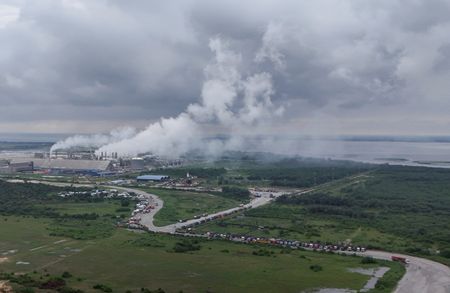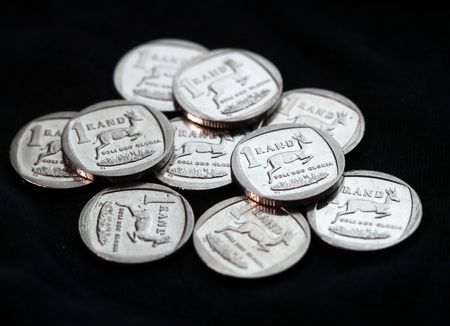By Lawrence Delevingne and Naomi Rovnick
(Reuters) -Wall Street stocks recovered some ground on Wednesday after technology conglomerate Alphabet rose on a favorable antitrust ruling, but gains were muted by softer-than-expected labor market data that could influence the U.S. central bank’s upcoming interest-rate decision.
Job openings, a measure of labor demand, dropped 176,000 to 7.181 million by the last day of July, the Labor Department’s Bureau of Labor Statistics said in its “JOLTS” report on Wednesday. Economists polled by Reuters had forecast 7.378 million unfilled jobs.
The Dow Jones Industrial Average fell 0.5%, the S&P 500 rose 0.1%, and the Nasdaq Composite added 0.54%. Alphabet jumped around 8%, while Apple also gained about 3% as the ruling allowed Google to continue lucrative payments to the iPhone maker.
However, a selloff in global long-dated bonds sent Japan’s borrowing costs to record highs on Wednesday, as mounting concerns over government debt sustainability and long-term inflation also rattled investors in Europe.
Spot gold hit an all-time high of $3,577 as the rush out of long-term government debt, traditionally considered low-risk, sparked a hunt for alternative safe-haven assets.
The 30-year Japanese government bond yield hit an unprecedented 3.28% on Wednesday, a day after selloffs in similarly dated British gilts, U.S. Treasuries and Canadian bonds.
“The economic reforms needed to really cover increasing debt are lacking, and the capital market sees that,” Deutsche Bank CEO Christian Sewing said about the long-dated debt selloff at a conference on Wednesday morning.
The trend may continue, he added, “if we see a further increase in political instability, if we don’t see any reforms.”
British finance minister Rachel Reeves is expected to raise taxes in her autumn budget to remain in line with her fiscal targets, while in France Prime Minister Francois Bayrou looks set to lose a confidence vote as opposition parties balk at his spending cuts.
In Japan, government departments have just presented record budget requests and senior aides to Prime Minister Shigeru Ishiba, including Secretary-General Hiroshi Moriyama, have offered to resign following their party’s defeat in July’s upper house election.
On Wednesday, British 30-year gilt yields rose 6 basis points to a fresh post-1998 high of 5.752%, before recovering to last trade at 5.6%.
Germany’s 30-year yield stood at 3.36%, remaining close to its highest level in 14 years.
The global trend would likely feed on itself, some analysts said, because higher yields in Japan meant Japanese savers who had for decades looked to overseas assets for income now had fewer reasons to buy non-domestic government debt.
“Global bond markets no longer benefit from the Japanese hunt for yield,” L&G Asia head of investment strategy Ben Bennett said. “It’s a perfect storm for long-dated bonds and a headache for governments.”
RIPPLE EFFECTS
U.S. Treasury yields dropped on Wednesday on news that job openings fell in July.
The 30-year U.S. Treasury yield briefly rose above 5% during Asia trade and last stood at 4.9%. With yields at this level, investors are starting to watch for spillovers into other asset classes.
“The 5% level is going to be impactful to equities,” said Josh Chastant, portfolio manager, public markets at GuideStone Funds. “And you are starting to see some of that pressure.”
The gap between 2-year and 30-year U.S. government bond yields stands at about 129 bps, around its highest since December 2021, while the comparable measure in Britain is the highest since 2017.
Britain’s pound briefly fell to a four-week low of $1.343, before recovering a little. Japan’s yen was a touch higher at 148 per dollar after sliding 0.8% in the previous session.
The U.S. dollar extended losses against major currencies, including the yen, Swiss franc and euro on Wednesday. The dollar index, which measures the greenback against a basket of currencies, fell 0.3%.
European stock markets remained unscathed as traders pinned their hopes on an anticipated U.S. rate cut later this month, with Europe’s STOXX index up 0.66%.
But Japan’s broad Topix share index closed almost 1.1% lower and MSCI’s broad index of Asia-Pacific shares outside Japan dropped 0.4%.
TARIFF TREMORS
European purchasing managers’ indexes on Wednesday, viewed as barometers of overall economic conditions, showed expansion in Germany had slowed and France remained in contractionary territory as businesses dealt with U.S. President Donald Trump’s unpredictable tariff policies.
Trump said on Tuesday his administration would ask the Supreme Court for an expedited ruling on tariffs that an appeals court found illegal last week. The court allowed for the tariffs to stay in place until October 14.
U.S. manufacturing also contracted for a sixth straight month in August as factories grappled with the impact of import tariffs, data showed on Tuesday, helping to drive Brent crude oil 2.4% lower to $67.5 a barrel on Wednesday.
(Reporting by Lawrence Delevingne in Boston and Naomi Rovnick in London; Additional reporting by Tom Sims in Frankfurt, Dhara Ranasinghe in London, Rocky Swift in Tokyo and Ankur Banerjee and Rae Wee in Singapore; Editing by Alex Richardson, William Maclean and Richard Chang)











